As those of you who follow this site know, while I occasionally come out against people running for local elected office, I rarely, if ever, come out and endorse candidates, at least during primary season, when we have multiple Democrats running against one another. Well, I’ve decided to make an exception… I’m endorsing former State Rep Jeff Irwin (seen below with his wife, Kathryn Loomis, and their children, Mac and Sylvia) for the Michigan State Senate. Not only have I found Jeff to be the most responsive politician I’ve ever had the occasion to have worked with, and one of the hardest fighting progressives that I know, but, as we just recently had sons in the same preschool class, I think I’ve got a pretty good sense of him as a regular human being, outside the world of politics, and my sense is that he’s exactly the kind of person we need representing us in Lansing. So, if you live in the 18th District, which encompasses Ypsilanti, Ypsilanti Township, Pittsfield Township, Ann Arbor, Ann Arbor Township, Saline, Milan, Augusta Township, Salem Township, Superior Township, and York Township, and you’re looking for a candidate to enthusiastically support, I’d appreciate it if you’d consider backing Jeff, who, by the way, will be here in Ypsi the evening of November 1, officially kicking off his campaign at Bona Sera Underground. [Details about the event, which I’m happy to be co-hosting with my wife Linette and a lot of other fine folks, can be found here.]
MARK: OK, it’s no longer a secret… According to MLive you’re now officially a candidate for State Senate.
JEFF: I wasn’t exactly trying to keep it secret. But, yes, I formally launched the campaign… In fact, there’s going to be a campaign kickoff event in Ypsilanti on Wednesday, November 1.
MARK: Was it just a coincidence that you made the official announcement the day after I told you that I was going to break my rule about never coming out publicly for local candidates, and support you?
JEFF: Yes, that was just a coincidence.
MARK: While your candidacy, as you say, wasn’t exactly a secret, it must feel good to get things officially underway.
JEFF: Well, it’s something that I enjoy. I love public service, and I really like talking with people about politics and about how, by working together, we can make life better for the people of Michigan. I think that I was effective in some meaningful ways while in Lansing, working as a State Rep, and I want to continue the fight to improve our government. So, yeah, I want to tell everybody.
MARK: OK, for people who don’t know you, let’s go back a few years and start at the beginning… What’s your first memory?
JEFF: Wow. I have little snippets of early memories, mostly of all of the places we lived in the Soo, the creaking door of our trailer, scraping blue paint off of wood siding on Riverside Drive, picking raspberries in the woods past the cemetery… But the first memory I can accurately place in both space and time is on my fifth birthday, when I went over the handlebars of my first bike. I remember that my family watched as I briefly rode the bicycle, and then crashed.
MARK: And where would that have been, geographically speaking?
JEFF: I was riding down the sidewalk in front of my family’s house on Superior Street, in Sault Ste Marie, Michigan.
MARK: And you grew up in a political family, correct?
JEFF: Yes. My father and mother are both very political. In fact, he was the State Senator when I crashed that bike. He served from ‘78 through ‘90. For what it’s worth, I also have very early memories in Lansing, being at the Capitol, watching people like Lana Pollack, John Engler, and my dad.
 MARK: What did you make of your father when you saw him out there, on the floor of the Senate? Were you able to comprehend what was going on?
MARK: What did you make of your father when you saw him out there, on the floor of the Senate? Were you able to comprehend what was going on?
JEFF: I had a sense of it, but most of it was over my head. I was dragged along to quite a few political events. And the conversations around the kitchen table were infused with current events and public policy. So, yeah, I guess you could say having a dad in elected office demystified politics and government. I had a sense early on not only that this work was important, but that it was something people just did.
MARK: Do you remember any of your father’s races? Were they tough at all on your family, and is that something that you thought about before making the decision to run for State Senate?
JEFF: Yes, I can remember his races. They were hard on the family because we were on the road constantly. And, yes, it’s something I considered before announcing my run.
I don’t remember his first race at all, and that was probably the craziest and most stressful. But I remember the others, at least through the lens of a kid. His race in ‘88 for Congress is the one I remember most. He lost, but came close. Two years later, Bart Stupak became the first Democrat to hold that seat in many years.
Those campaigns, as I remember them, were definitely hardest on my mom. Geographically speaking, the 37th district is enormous, and, given the state of technology back then, that meant that we spent a lot of time apart. And we spent a lot of time in the car… Lansing to Sault Ste Marie is quite a commute.
And my dad really had to work hard at it. As a Democrat, people didn’t give him much of a chance of winning that first time. Then, during his first reelection campaign, in 1982, the Republicans redistricted the 37th to give them more of an advantage. So, the campaigns were always tough. But, even if the races had been easier, in a district that big, a State Senator basically lives on the road all the time.
MARK: So how did all of this weigh on your decision to run for State Senate?
JEFF: It’s complicated. I know that I benefitted from the exposure to the world of government and that I learned quite a bit traveling all over northern Michigan. But we were on the road all the time, and politics can be all-consuming. Like I said, the drive from Sault Ste Marie to Lansing is long. But so is the drive to Alpena or Escanaba. That district was – and still is – huge. We spent quite a bit of time in the car. And, the phone was attached to the wall.
So, this is much different. The 18th is a much smaller district, and a technology revolution has made it much easier for me to be both present in my family’s life and a good public servant. I can communicate with people over email and through social media in ways that were not possible in 1983. I can host a town hall in my district, and still make it home before too late. And, I drag my children along to all sorts of events that I was similarly subjected to as a young child. I tell myself – and them – that it’s for their own good.
[above: Jeff and his son Mackinac working alongside Sen Knezek.]
MARK: And you first ran for elected office when you were still at the University of Michigan… Was that always part of the plan? Did you know from that early age that you were going to run for office?
JEFF: No. I was certain in my teens that I would not be going into politics. I wanted to maybe go into law, like my mom.
MARK: What kind of law did your mom practice?
JEFF: Labor law, which led from private practice to a long career with the MEA (a teachers’ union) and MESSA (the insurance provider for many educators).
MARK: OK, let’s go back to that first decision to run for office. What was happening in your life at the time?
JEFF: First, probably because of my family’s history, I thought of politics as something that everybody participates in. So, as a student at the University of Michigan, I volunteered to help local Democrats like Chris Kolb, Liz Brater, and Alma Wheeler Smith. I knocked doors for Clinton/Gore ‘96 and gathered signatures to put assisted suicide on the ballot in ‘98. That same cycle, I also volunteered for a local ballot measure for land preservation. And, maybe most importantly, I volunteered for the board of the Ann Arbor Tenants’ Union (AATU), which offered tenant-landlord help to anybody who needed it. It was a great service.
[above: Jeff at a protest in 2000.]
MARK: Why is it that you say your work with the AATU was the most important thing in pushing you toward elected office?
JEFF: Well, when I was a student, the University, and some in student government, wanted to push the AATU out of existence. Maybe they wanted to reclaim more of the office space in the Union. Maybe it had something to do with the fact that the University is the largest landlord in town. Or maybe there were other reasons. Whatever the reason, people wanted to get rid of the AATU, and I wanted to keep it and further its mission to help people avoid court or eviction. In the end, fighting to save funding for this service helped me understand what my parents were so passionate about. I felt like I’d found something that I was good at… that I had found this nexus where analysis, argument, and organizing could be used to make people’s lives better. Also, helping people is tremendously fulfilling. I saw that the work was making my life better too.
Well, at this same time, I was waiting tables at the Bella Ciao (customer service is the best training for politics), and I met Lisa Wozniak, through a co-worker, now her husband, Kenneth Simon. Lisa was running the Great Lakes Region for the League of Conservation Voters, and needed a program assistant to cover organizing tasks in Michigan and Illinois. It was a great opportunity for me, and I took the job… I ended up staying with LCV for many years in various roles.
So, all of that sucked me into local and state politics. And, when a seat opened up on the Washtenaw County Commission, I thought there were some important things I could accomplish there in terms of human services, affordable housing, and environmental protection. Fortunately, I received more votes than the other candidates, and I was able to serve there for 11 years. During that time, I contributed to the County’s building of the Delonis Center, increasing funding for affordable housing, passing domestic partner benefits for our employees, protecting thousands of acres of natural areas, establishing the Washtenaw Health Plan, building a Head Start building and program, and much more. I feel very fortunate to have served as part of Washtenaw County Government. There are amazing people in that organization helping people everyday.
But, to get back to your original question, no, I never planned to start running for office.
[above: Jeff launches his first political campaign.]
MARK: OK, so you’ve mentioned what you’re the most proud of having accomplished as a County Commissioner… What about as a State Rep? What were you the most proud of having accomplished… or having stopped the Republicans from accomplishing… during your 8 years in Lansing?
JEFF: There’s a lot that I’m proud of. We had some great wins for individual constituents who were having trouble with the bureaucracy. Sometimes, when a citizen is having trouble with their taxes, their benefits, or their unemployment insurance, they need help in working with the state agencies. We were responsive and honest with constituents, trying always to answer their questions rather than give your standard evasive answers, like, “I will keep your thoughts in mind as this bill moves through the legislature.”
Also, one of the responsibilities of a legislator in the minority is to cast a compelling vision of what would be different if we elected a more liberal legislature. In this regard, I was a loud voice for the progressive vision in Lansing, and I believe I was successful in calling attention to some of our most important issues, like our dismal funding for education.
MARK: What about your legislative track record?
JEFF: Well, because income inequality is so dramatic, my first bill was a proposal to institute a graduated income tax. Had it passed, it would have provided a tax cut to 94% of Michigan taxpayers, while still raising more revenue. By increasing the marginal rates on very high incomes, you can balance out the regressive nature of state and local taxes. I think this proposal is a compelling way to contrast Democratic vs Republican tax policy.
I also focused on environmental issues, taking the lead on many efforts to protect clean air, clean water, and the Great Lakes. For instance, I was the first legislator to take action on Enbridge’s Line 5, and our office, together with the office of Rep Sarah Roberts, designed the first Pipeline Safety Package, which required regular and independent testing of the pipeline integrity and achoring, better emergency response planning, and earlier public notification of pipeline expansions. Later, I introduced the resolution calling on the Governor and Attorney General to exercise the state’s termination clause in the easement that governs that pipeline’s placement.
My office also led the fight for second-parent adoption, starting in 2011, and running through 2015, so that all families would be treated equally by our family-law system. These were a few of the important battles to fight, and drawing more attention to them was a part of my role in the legislature.
[above: Jeff has been a guest a few times on my Saturday Six Pack show. This photo was taken during his first visit, when we discussed open carry in our schools and the conditions of Michigan’s roads, among other things. Photo courtesy Kate de Fuccio.]
MARK: Am I remembering correctly that you were also involved in the Flint water investigation?
JEFF: Yes, I was selected as the only House Democrat on the legislature’s investigatory committee on Flint. An injustice that continues to this day is that the legislature hasn’t made any of the changes that were proposed by the Governor’s Flint Water Task Force, the recommendations from our Committee, or the recommendations in my report, “An Action Plan for Flint.” But, I was proud that our committee held hearings in Flint, giving Flint residents a chance to speak out on the record to state officials about the pitiful pace of the response. And I was proud that I pushed appropriations amendments to start pipe replacement in Flint earlier. Here was an opportunity for the legislature to address the damage that we had done to Flint’s people and its infrastructure, and the legislature dragged its feet, missing most of 2016 for pipe replacement. Like with the bills that took away earned income tax credits and the back-to-school clothing allowance for poor families, I couldn’t change the result; but, I am proud that I didn’t silently sit by.
MARK: You were also able, during your time in the State House, to find common cause with conservatives on issues like criminal justice reform. Can you talk a bit about that?
JEFF: Yeah. What I’m probably most proud of is getting tangible things done despite being in the minority. For instance, I was a part of pushing forward asset-forfeiture reform and ending zero tolerance in schools. I built alliances with conservatives, the ACLU, and the faith-based community to “raise the age” that juveniles can be charged as adults without judicial approval. Although those bills died in the State Senate, we built bi-partisan momentum in favor of restorative justice.
I’m particularly proud of my work with conservative colleagues to protect clean energy and net metering with our Energy Freedom legislation, and the “green tea” coalition that resulted.
Finally, I led the fight to opt Michigan into Heat and Eat, leveraging more federal food assistance for low income residents. As a result of my amendment to the budget, over 325,000 Michigan residents received $75 more every month. This means that, for some residents, they went from receiving $15 a month in food-assistance benefits to receiving $90 a month, an amount that makes a real difference to individuals struggling to afford the basics. In total, this means that some of Michigan’s neediest people are getting an additional $300 million per year.
It’s examples like this that drive me to do the work. I know that however intractable the situation appears to be, there is real and good work to be done in the details. There are opportunities to help people and to make Michigan better, and to fight for tangible changes that can be won.
MARK: Clearly you’ve been doing work since being term-limited out of your House seat a year or so ago, getting out in the 18th District, and talking with people in Milan, Saline, and all the Townships in the surrounding area. I’m curious as to what that experience has been like. The concerns of people in the 18th, I would imagine, are somewhat different than your previous constituents, right?
JEFF: People everywhere mostly want the same things from their government. They want a safe place for them and their families to live. They want good schools, and they want the transportation and water infrastructure to function properly. They also want a fairer economic system in which people can see a doctor when they’re sick, and find work when they want it (and rest when they need it). People across this district think we have a broken economic system, a segregated school system, and dangerous people in the highest positions of power. So, in my estimation, the concerns of people across the district are more similar than different.
But, because of that broken economic system, and our segregated school system, there are different concerns outside of Ann Arbor, especially regarding school funding. While Ann Arbor’s school funding is lagging by national standards, other districts are being strangled by a much tighter noose. And, while a medical emergency, or car trouble, can bring the failures of our health care system, or our roads, into sharp relief for more affluent citizens, those same events often destroy people and whole families who are less well off.
MARK: What else have you been doing since being term-limited out of the State House, other than weighing the possibility of a run for the State Senate, and spending more time getting to know the 18th District?
JEFF: My first priority has been to my family, and I’ve been trying to support my wife’s career. Kathryn is a tremendously smart attorney who has backed me up for years while I’ve had a crazy and unpredictable schedule. We have two children, Sylvia and Mackinac, and I’ve been trying to spend much more time with them, as well as getting involved with my PTO, coaching Pasta Bridges for Science Olympiad, and still working.
MARK: And, I believe you launched a consulting firm, correct?
JEFF: Right. I started a consulting firm, and I’ve been working on ideas from energy to education. But, mainly, my work hours are being spent as Political Director for the Coalition to Regulate Marijuana Like Alcohol. We’ve been working to end cannabis prohibition much like in Colorado, California, Alaska, Washington, Oregon, Maine, Massachusetts, and Nevada. Our approach is to put this on the 2018 ballot, and we are over 90% of the way to our goal of collecting 366,000 signatures. We need 252,523.
If we are successful, voters will have a chance to end over 20,000 arrests every year in Michigan. These arrests cost us big money, damage citizens’ lives, and drive communities apart. I’d rather regulate the product, thereby gaining revenue for schools, roads, and local government, all while protecting consumers from the problems that can thrive in an illicit market. Prohibition is a failure, and, just like it did with alcohol, the policy increases crime and the dangers of drug abuse. I want to end prohibition and close this gateway to the school-to-prison pipeline. And, with the money saved, we can apply our energies to better addressing the opioid crisis. Making substance abuse treatment available to everybody who wants it is an obvious first step.
MARK: This seat that you’re running for, as you and I have discussed in the past, has been held by a woman for the past, what, 30 years or more… In fact, if I’m not mistaken, of all the seats in the Michigan legislature, it might be the one longest held by a woman… Given that, I’m curious to know what your message is to women voters, who account for about 51% of the electorate in the District.
JEFF: Yes, Senator Lana Pollack held this seat back in the 1980s, and we’ve had a string of great State Senators from Washtenaw County. (I worked in Senator Alma Wheeler Smith’s office in the late nineties.)
Because I’ve been in office, people can actually look at my record on issues. When the Republicans attacked abortion rights, contraception coverage, and equal treatment by health insurers, I stood up against them. When it came time for leadership from our side, I worked with the Progressive Women’s Caucus, Planned Parenthood, NOW, the ACLU, and others to introduce comprehensive sex education legislation as part of the Prevention First package. I also co-chaired the Women’s Issues Task Force, traveling the state With Rep Hovey-Wright to do town halls and take input from women across Michigan to improve and enhance our agenda. And the Progressive Women’s Caucus awarded me their first Manbassador award because of my consistent and aggressive work to fight for women’s rights and to help elect pro-choice women.
In short, I’m confident that I can do the best job representing our values and winning tangible changes that make people’s lives better. When it comes to standing up for women’s rights, I have a documented history of helping promote women in leadership, standing behind my colleagues, and taking up the fight myself.
[above: Jeff does ‘the robot’ for women’s health care.]
MARK: So, as of right now, you have two opponents, with the possibility of third. Both Michelle Deatrick, a relatively new Washtenaw County Commissioner, and Anuja Rajendra, founder of the BollyFit dance and fitness studio in Ann Arbor, have formally announced. And word is that State Representative Adam Zemke is likely to run as well… Clearly, as you’ve decided to run, you think you have a chance against these folks. I’m curious as to what you think your advantage is.
JEFF: These are all good people, and I am sure that more good people will consider or enter the race. I don’t have anything bad to say about any of them, and I can say from having worked with Adam Zemke that he is a hard-working and well-intentioned legislator. Having said that, I wouldn’t run if I didn’t believe that I have the experience and personality to be the most effective. The decade I spent on the county board connects me to stories and knowledge that are essential in the fight to protect and improve mental health care. The years I spent working for clean air and water gave me tools in the effort to encourage the MDEQ to set a new standard for dioxane cleanup and – going forward – to paint the picture of how our weak environmental laws endanger the health and the economy of my Republican colleagues’ districts. These are just a couple of examples of how experience is important, especially when you’re in the minority.
When you don’t have the votes, sometimes you can stop bad ideas with better information, pointed questions, and amendments that make your colleagues think twice. I don’t have any particular angle, but I hope that my policy chops and genuine desire to help people comes through. I suppose I also hope that voters look at the records of the candidates and what we have done in the past. So far, I am the only candidate with a demonstrated record of progressive accomplishments both locally and in Lansing.
MARK: By my count, of the 38 people currently serving in the Michigan State Senate, only 12 are eligible to run for reelection in 2018… 4 Democrats and 8 Republicans… meaning that we’re looking at at 26 open races, at the very least. While I don’t suspect it’s likely that we’ll take the Senate, I have to think that significant gains could be made, if we can motivate people to turn out and cast their votes against Trump and the Republican Party, who have, in the last few weeks alone, taken action to cut health care subsidies for America’s poor, and give huge tax breaks to the most wealthy. I know you’re busy thinking about your own race, but I’m curious as to what kind of coordination might be taking place at the state level to see to it that Democrats have a consistent statewide message in 2018… taking advantage of the fact that marijuana and redistricting will likely both be bringing young people to the polls.
JEFF: Democrats currently hold 11 of 38 State Senate seats, and haven’t had a majority there since 1982. And the district maps, as you know, have been drawn to ensure a Republican majority going forward. So, yes, there’s likely not a path to a Democratic majority in 2018, unless there’s a wave of historic proportion. Democrats, though, could probably have a good year and pick up a few seats.
The most important part of this is candidate recruitment. And the Senate Dems are recruiting some great candidates in swing races. By way of example, I would point to Rep Winnie Brinks in Grand Rapids. That’s a race that Dems can win, and we have a great candidate to pick up that seat.
MARK: Agreed. I’m just curious to what extent the winner of the Democratic primary here in the 18th might expect in the way of assistance from the state and national parties. While I know that every district is different, and what works here might not work elsewhere, it just seem to me that, given what we’ve experienced with Synder, Trump, and their ilk, now might be the time for a coordinated campaign to restore sanity at every level of government… Kind of a “No more Flints, No more Puerto Ricos” kind of thing.
JEFF: The winner of the Democratic primary in the 18th shouldn’t expect any assistance from the state and national parties. The help flows the other way. This is why, when I was in the State House, I raised money and gave it to progressive candidates in swing races across the state. This was especially true in 2012 when I served as the caucus campaign chair (we picked up 5 seats, but it should have been more). Also, I spent every campaign season knocking on doors or helping candidates elsewhere, sometimes organizing car pools of local volunteers to hit neighborhoods outside of Washtenaw County.
MARK: I wasn’t really asking whether or not the state or national parties might provide financial or logistical support. I was asking about messaging, and whether or not there was any sense that we might be coordinating at a statewide level. Given the seriousness of what we’re facing, and the fact, as you said, that voters in Michigan, regardless of where they live, pretty much want the same things, it seems to me that someone should be thinking about the Democratic message at a statewide level.
JEFF: We clearly need better statewide messaging, and we need candidates at the local level that can connect the state and national vision with local action and local needs. And there are many people working on this, often selling competing visions of where to focus the message. For instance, in the aftermath of 2016 many pundits focused on the loss of rural white voters in larger numbers than Democrats had previously lost those voters. Others focused on the much larger group of people who simply didn’t turn out to vote this time. Depending on which scenario you focus on, the natural reactions in terms of policy and message suggest opposite responses to the loss. You can tell where I line up in the way I characterized the positions.
I think the one thing the party can do is consistently focus on economic messages. Democratic policies on health care, taxes, education, and infrastructure are squarely in the interests of the 99%. We should be talking about that at every opportunity and finding ways to connect our local struggles to a national movement for a more fair economy. I think this is why President Obama was so successful as candidate Obama, because he repeatedly said that our American Dream should mean that every person has enough to live a good life and that every person deserves respect. That’s a nice way to encapsulate the tenets of social justice.
For myself, I work at communicating better and getting that message out there. In general, I want to pull the party back to its roots and that’s why I introduced the graduated income tax as my first bill – to highlight our regressive state and local taxes and add focus to an economic issue that would benefit the vast majority.
MARK: I don’t know how accurate it is, but my sense is that people see you as a left leaning Democrat with an interest in the environment, criminal justice reform, and the legalization of marijuana, which isn’t, of course, to say that you don’t also care about job creation, public education, and a whole host of other things. I’m just curious to what extent, assuming you agree with that assessment, you see it as a challenge?
JEFF: I can’t say for certain how people see me, but I suppose, that if people see me at all, that’s a plus. Being a State Rep, especially one of 110 and in the minority, it’s difficult to cut through sports and pop culture to communicate anything of civic importance. So if my passion for clean air, clean water, and justice for all made it through, I’m grateful. Those are definitely issues I care about. Sometimes, I am concerned that associating myself with a sticky issue like cannabis might hurt my career. But, then I remind myself that it isn’t about me, and I try to stay productive.
I should mention that, while I might be best known for the issues you noted, I’m motivated by other issues, and that I’ve spent significantly more time on issues like food assistance, the graduated income tax, and improving our system of in-home care than I did on the legalization of cannabis. One issue is a click-driver, and the others, sadly, are not.
MARK: Speaking of job creation, what’s your economic message? How would you, as a State Senator, help bring better jobs to the 18th District?
JEFF: We need to have better schools. This is obviously a complicated topic, but good schools are the most reliable way to attract higher-paying jobs. In brief, the state must get serious about funding schools at a better and more equitable level. Cuts in funding, combined with increasing and constantly changing high-stakes testing, have pushed schools to teach to the test, drill and kill. We need to get back to treating teachers like professionals, and stop changing and increasing the frequency of assessments.
Also, it needs to be said that if we want to improve schools that struggle the most, we need to fix the holes in our social safety net. We have to do a better job of addressing childhood poverty. We need targeted funding for tutoring, mentoring, and afterschool programs with food for hungry kids.
More short term, our region can take advantage of big opportunities like the American Center for Mobility, which represents a huge opportunity for us to establish a major, advanced manufacturing and IT hub here in Washtenaw County. It’s an emerging market that we’re well-positioned to excel in. I want to facilitate this development and take advantage of federal resources, clean up the site, and continue growing a sector that is bursting out of MCity.
MARK: OK, let’s get back to the economy. What else could we do to improve the current situation in the 18th District?
JEFF: Well, looking more broadly than jobs, we need to fix our tax structure. Our current state tax system is regressive. A graduated income tax could fix that, but there are smaller changes that would help make our system more fair for wage earners. We need to restore Michigan’s EITC and the per child deductions. I would also like to pass other progressive tax policies that I’ve proposed in the past, like a tax credit for educators that spend their own money on school supplies or for farmers that donate food to food rescue organizations.
Quality, affordable child care is another necessity for working families. Michigan needs to develop better support, especially for single-parents and parents of very young children. This is a crucial period in the economic lives of young families and child care and preschool are essential resources for keeping kids engaged and parents in the workforce. There is no reason that we have failed to implement universal pre-K for 3 year olds and up except that we haven’t been willing to make it a priority. We know this is an essential support for the long-term economic prospects of children, and that child care is so expensive that it pushes many people out of the workforce because they can’t justify working unless they have a family member to lean on.
Finally, government should do better providing essential services for the economy. Our roads are rotten, both for cars and for non-motorized users. We need to do better and there is some glimmer of hope that we can work with Republicans on making government work on this basic level. The same is true for our water infrastructure. These systems need major investment, and if we do it right, there is benefit in terms of employment and a long-term asset.
MARK: Let’s talk specifically about Ypsilanti. While we’re presently one of Michigan’s five fastest growing cities, we’re still economically challenged, in large part due to changes in state revenue sharing policies, and the passage of both Proposition A and the Headlee Amendment. Assuming we elect you, what will you do to help Michigan’s aging cities, like Ypsilanti, which seem to have the deck stacked against them?
JEFF: You hit on one big thing that the state could and should do to help cities like Ypsilanti, restore all – or even a portion of – the statutory revenue sharing cuts. Lansing has drained local governments of funding that was promised as a bargain for the elimination of local taxing power. And local governments across Michigan are feeling the squeeze, meaning that there is some bi-partisan energy for this idea. The problem is that there is very little institutional knowledge in the legislature and fewer and fewer of the legislators have experience in local government. Too many see revenue sharing as a magnanimous gift, rather than the obligation that it actually is. So, the legislature should start making good on revenue sharing promises, and stop taking away local control when it comes to collective bargaining, living wages, and litter control measures. If elected, I will work with cities and other local governments that have been burned by the state to build this coalition for change.
There are many good ideas in this space, but because Ypsilanti is home to EMU, there are other state obligations to the city that need to be met. For instance, during my time in Lansing, the Legislature increased fire protection grants and with a few more adjustments, the state could be making good on it’s promise to provide fire protection to it’s own campuses rather than relying on city taxpayers to protect the state without any revenue from those properties. Also, I will push for more and better investments in public housing and housing supports. MSHDA needs reform and refocusing, not a Governor and legislature that raids their funds like a corporate welfare piggy bank.
We also need to restore and reinvigorate historic preservation tax credits and bring new funding into our brownfield and LUST cleanup budgets. Our lead paint remediation program and our weatherization programs are underfunded and need to be augmented. These are programs that put local people to work building real value that protects public health and the environment.
These are all policies that assist the economies of older cities where older housing stock and polluted sites can cause huge barriers to jobs and economic development. As a House member, I pushed for a new Clean Michigan Initiative II as a way to jumpstart these programs addressing unhealthy indoor air, cleaning up polluted sites, and meeting water infrastructure needs.
MARK: I’m trying to be sensitive to your time, as I know you have babies to kiss, and hands to shake, but I’m curious if you can say a few words about health care.
JEFF: We need a health care system that provides mental health parity and basic physical health, dental, and vision care for everybody. When people need preventative care or get sick, they should be able to get treatment.
This is a moral issue, but it isn’t only a moral issue. When Michigan expanded Medicaid, over 600,000 residents gained access to preventative care. That saves lives and dollars in the long term. Also, we expanded Healthy Kids Dental from a pilot program to statewide, ensuring that indigent kids receive dental care. Those were important improvements that we must fight to keep because these programs are under budget pressure every year.
We also have to protect these programs while fending off attacks on coverage for contraception and access to abortion. And we have to make sure that the efforts to reduce auto insurance rates aren’t exploited by companies that want to shift the burden for catastrophically injured people to the taxpayers.
MARK: And how about energy policy? Do you have thoughts as to what we might be able to do in Lansing to move the state in the right direction?
JEFF: First off, I am a proponent of clean energy and we need: community solar, an improved renewable portfolio standard, better energy efficiency standards, no extra property taxes for small systems, and microgrids. Our power reliability is poor and our utilities are fighting innovation in street lighting and distributed generation. Our energy grid is another element of our basic infrastructure that has been neglected and the state should require investments in reliability and microgrid capability that will create and attract jobs. These clean energy investments provide jobs and long term value.
On the dirty energy side, we need to improve our fracking regulations by requiring methane capture at the wellhead, requiring full disclosure of the chemicals pumped underground, and by preventing fracking companies from destroying aquifers with pumping or wastewater. When natural gas prices go up, the pressure for fracking will increase in Michigan and we should hurry to develop renewables and the best protections for our water.
MARK: You alluded to criminal justice reform earlier, but I’m wondering if there’s anything more that you’d like to say on the subject.
JEFF: There’s always more to say… Legalization of cannabis is an important criminal justice reform partly because it will close the gateway to the school to prison pipeline. It will also convert a big expense into increased revenue for our schools, roads, and local governments. But there is much more to say about our broader need for criminal justice reform and this is one of the areas where we can win progress, even in a conservative legislature.
Our criminal justice system is racist, and the War on Drugs is dividing and destroying our communities. This war pits our police force against our citizens and it makes drug abuse and addiction worse. Ever since I toured the County Jail – first in 1999 – I couldn’t ignore what was staring me in the face in sharp contrast. The justice system doesn’t treat everybody the same and that needs to stop. And the War on Drugs puts institutional racism on steroids. In short, we need to treat drug abuse as a public health problem, not a criminal justice issue.
Also, I was the lead advocate for protecting and then – after Gov Snyder destroyed it – reinvigorating the Michigan Prisoner Re-Entry Initiative, which reduced recidivism and crime by working with local agencies to make sure returning citizens stay on track with housing and employment. We need to bring that back as well as reform our parole and probation systems. When I served in the State House. I pushed to get body cams on all MSP Troopers and to reduce the number of juveniles charged for their crimes as adults. Also, I designed legislation to reform our MCOLES training standards for officers to include mental health, violence de-escalation, and cultural competency training. These accountability measures are important improvements that I will bring to the State Senate, if elected.
[above: Jeff on the Saturday Six Pack with me another time, seen here with our music director Jim Cherewick. Photo courtesy Kate de Fuccio.]
MARK: Before I let you go, I’m curious to know what you think about the dynamic between Ann Arbor and Ypsilanti relative to affordable housing, economic segregation and poverty, and what role you might have, if elected, in perhaps moving things in a more equitable direction. Specifically, I’m interested to know what you make of the fact, in spite our region recently being named the 8th most economically segregated region in the county, and the repeated warnings of the Washtenaw County Office of Community and Economic Development about inequality, Ann Arbor seems relativley uninterested in building affordable housing, instead apparently seeing it as Ypsilnati’s job to absorb its dispalced poor.
JEFF: Our region is very segregated in terms of race and economics, like the rest of Michigan. And Ann Arbor struggles more than most communities with diversity and affordability, punctuating the problem. That’s why, on the County Board of Commissioners, I voted to locate the Delonis Center and more affordable housing in my district, in downtown Ann Arbor. Sometimes this created blowback from neighbors or businesses, but mostly my Ann Arbor constituents are supportive of more affordable housing in the city, and share concerns about the lack of diversity in the city. We worked hard to find and locate supported housing in Ann Arbor. But, the statistics don’t lie. When developers are looking to build, the costs in Ann Arbor make it much harder to develop affordable housing within city limits and still have a project that makes economic sense. As a result, those few projects that we supported in the city don’t overcome the force of an economic system that relies on markets to steer both private and public investments.
This is a tough problem and one that will continue if we are successful in being a place where people want to be. The bottom line is that both Ann Arbor and Ypsilanti are desirable places to live and we are under pressure from the larger world that is increasingly looking for the types of amenities that we have: good schools, real downtowns, ample recreation opportunities, and the best weather.
The solution obviously isn’t to stop trying to improve the schools, parks, and downtowns that make our communities desirable. Instead, we need elected officials and citizens who are committed to actually doing something about it. Some of this leadership has to come from the cities, townships and county. When I was in local government I focused on increasing funding for affordable housing and expanding transit service countywide. (I co-founded Partners for Transit, which led to the AAATA expansion).
But, there are a number of proposals that I would bring to state government that can help increase the affordability in Ann Arbor and reduce the concentration of subsidized housing in surrounding communities. Many of those ideas I have already mentioned: historic and obsolete property tax credits, restoring MSHDA funding (and then expanding flexibility of those funds to allow more varied investments in public housing), and fixing our struggling schools with more equity, more funding for at-risk kids, and more support for afterschool programs.
Another one I haven’t mentioned is inclusionary zoning. Other states and communities have done this, notably Montgomery County in Maryland. This is a tool that we could add to our zoning statutes that would allow communities to require a percentage of affordable units in new construction. I know some Ann Arbor council members who are eager to use this tool, but are frustrated by a lack of enabling legislation.
MARK: So, with all that said, why should the people of Ypsilanti vote for you, and what should people expect if they come out to the campaign kickoff event on the evening of November 1 to talk with you at Bona Sera?
JEFF: I hope that people of Ypsilanti vote for me because they believe I will do the best work for our community. I think that my love for this important work shows and that this makes me better in the role. I hope that came through during my previous service and that it comes through during this campaign.
As far as the Ypsilanti Campaign Kickoff at Bona Sera Underground, people can expect a crowd of awesome people, political conversations, and a short speech, probably at 6:30. Also, I’m expecting a little dancing and have been promised the same from one of our hosts, Peri Stone-Palmquist, and “at least a hand jive” from Patti Smith.
[While Jeff’s official campaign site isn’t up yet, you can, for the time being, keep track of his campaign events and the like on Facebook.]


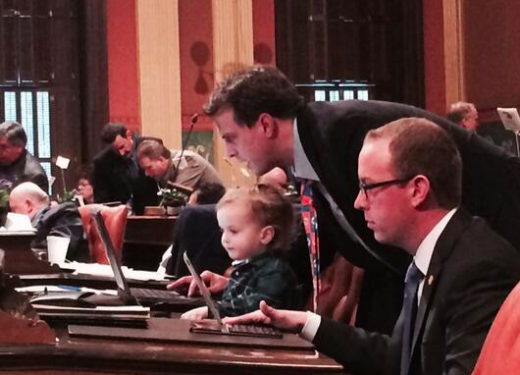
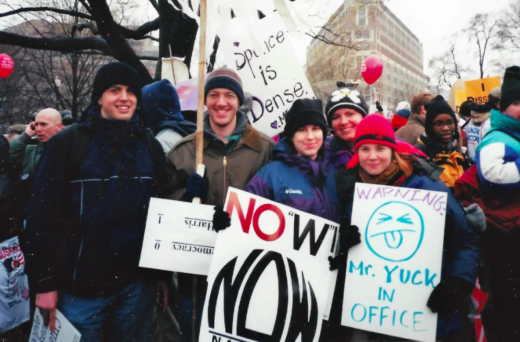
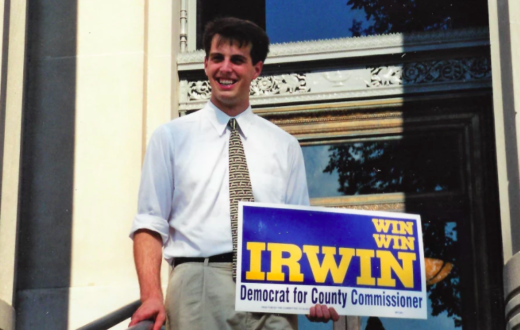
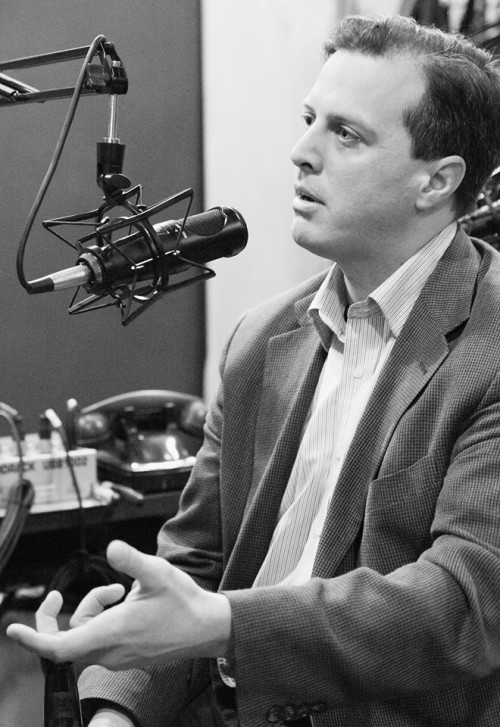
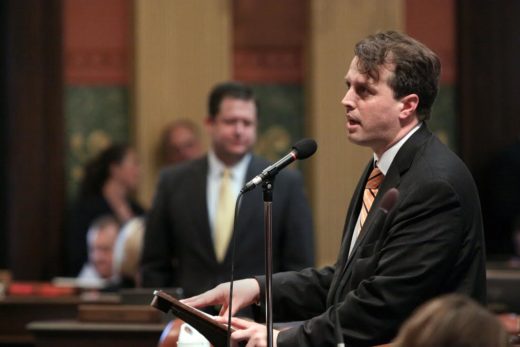
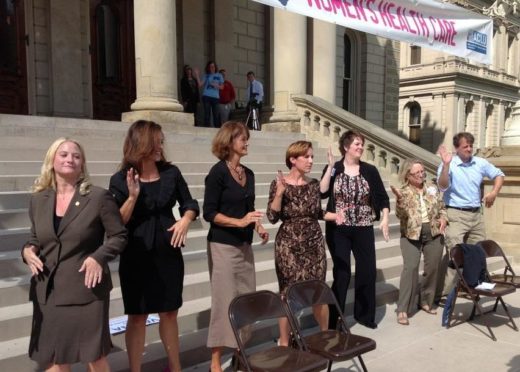
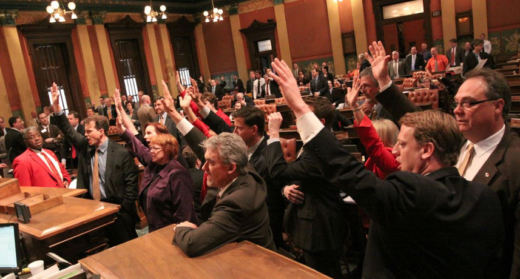
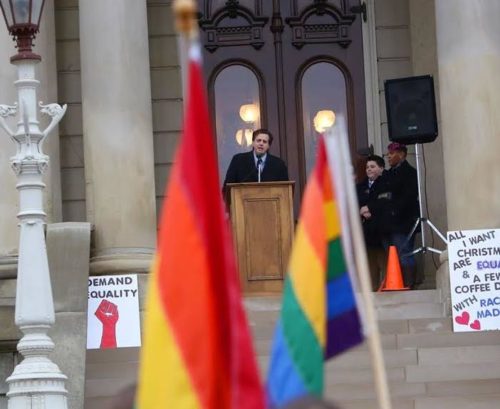
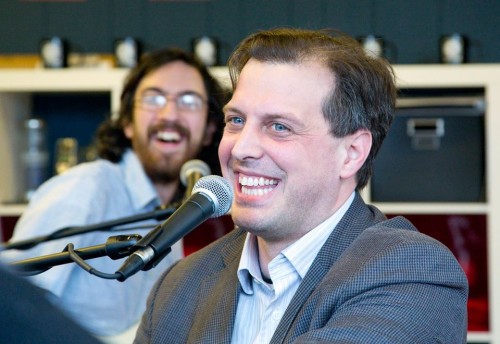











12 Comments
Loses my vote for his poor decision making skills exemplified by naming his kid Mackinac.
Just kidding… some good answers, plus has some impressive prior experience.
That being said, I haven’t done my homework on the other candidates yet. I’ll need to do that first before making an informed voting decision.
The County Commissioner that he’s running against has only served for one year which seems odd to me. I like enthusiasm and aggressiveness but I’d like to see what she can do here in the County before considering her for higher office. I don’t know the fitness entrepreneur he’s running against but I’m inclined to stay away CEO types this election cycle after experiencing Snyder and Trump. Zemke looks like a solid choice though. I’d be happy with either.
Ken and I are also sponsors (or were for the a2 event) and we will be there on Wednesday! Jeff is wonderful on a personal level and a fantastic champion on the political level. He is a great communicator and public speaker (I don’t say that lightly). Further, I think he has the temperament to deal with the shit show up in Lansing. Go, Jeff!
And ha ha I totally misread that as “at least a hand job”. Which would be an entirely different event.
But yes, I am warming up as I type (sort of)
Jeff was a good County Commissioner during the time we served together. But I am surprised to see that he claims support of the Delonis Center in his district. It was in my district.
I’ve always liked Jeff and he is very bright and very informed. I’m not endorsing him at this time but have not endorsed anyone else. A nice guy, very likeable. Closely associated with Rebekah Warren and Conan Smith (friends from college days). That has been a problem for me.
Vivienne. You’re right, I was wrong. My district had downtown but precinct 1-4 was the western edge.
Met Jeff this week at Cultivate and talked with him for a bit a the bar drinking coffee before I told him I worked there and before he told me what work he did. We had a great conversation as just 2 community members chatting, hope to attend to learn more.
After I made it home last night, I dug out some out maps. I was a little baffled because the shelter is in precinct 1-4 and I know that was in my district the first two times I ran. In fact, my first re-election was against a candidate who ran because of my shelter vote which happened in June of 2000 (http://www.ewashtenaw.org/government/clerk_register/Minutes/rop/year_2000/2000-07-05rop.pdf).
I think what happened is that we approved the Delonis Center while I represented that precinct and then, when the lines were redrawn for 2002, the district I represented moved east. And the district represented by Cmsr Armentrout took in the precinct with Delonis.
Great profile, Mark Maynard, thanks for writing it. Quite a track record you have there, Jeff Irwin. I look forward to seeing you both on Wednesday!
Anyone who supported the Ann Arbor Tenant Union (an IWW Union Shop) gets my vote. That Great Congress Woman Lynn Rivers also got her political start in the Tenant Union organizing a rent strike at her housing complex. A great many good people worked with that organization before the Regents finally shut off funding.
Seems like a very good guy. Thanks, Mark, for the information. Here are the money quotes from Mr. Irwin, above, for me:
” I know that however intractable the situation appears to be, there is real and good work to be done in the details. There are opportunities to help people and to make Michigan better, and to fight for tangible changes that can be won.”
and
“When you don’t have the votes, sometimes you can stop bad ideas with better information, pointed questions, and amendments that make your colleagues think twice.”
He does need to know that the leaders of Ypsilanti most emphatically DO NOT support “inclusionary zoning”, quite the opposite. The 2015 city-wide re-zoning was very clear–and explicit–about this–“we zone for what we want, not what we have”. And they zoned duplexes, for example, out of existence, even as replacements for existing duplexes.
It’s good to see a courageous Democrat tackling the big issues facing us in these perilous times – pot smoking, and daylight savings. I’m sold! Count me in as a groupie.
2 Trackbacks
[…] suppose something unexpected might happen, but, when I left Jeff Irwin’s party just a few minutes ago at the Aut Bar in Ann Arbor, he was leading his primary challenger, […]
[…] to know more about Jeff Irwin? Check out the interview I did with him during the Democratic primary, which is full of good […]